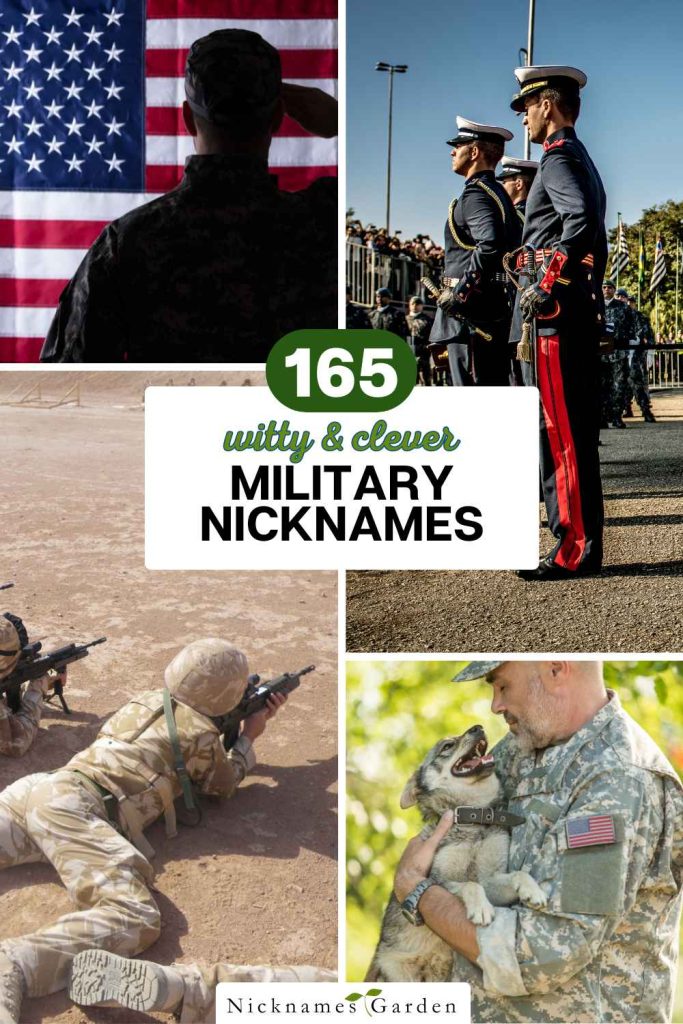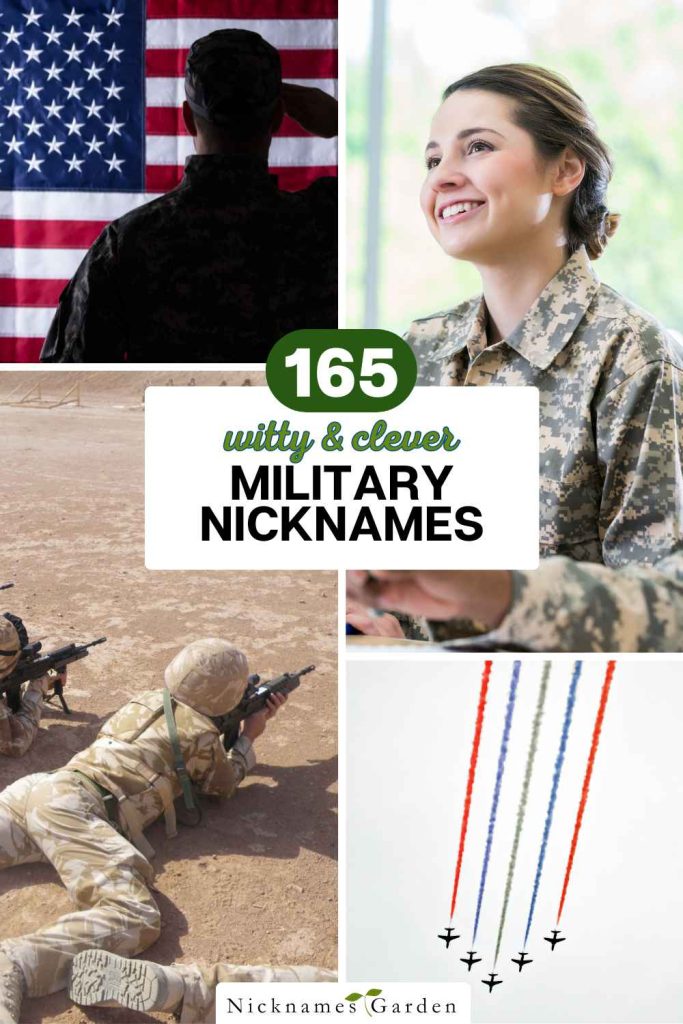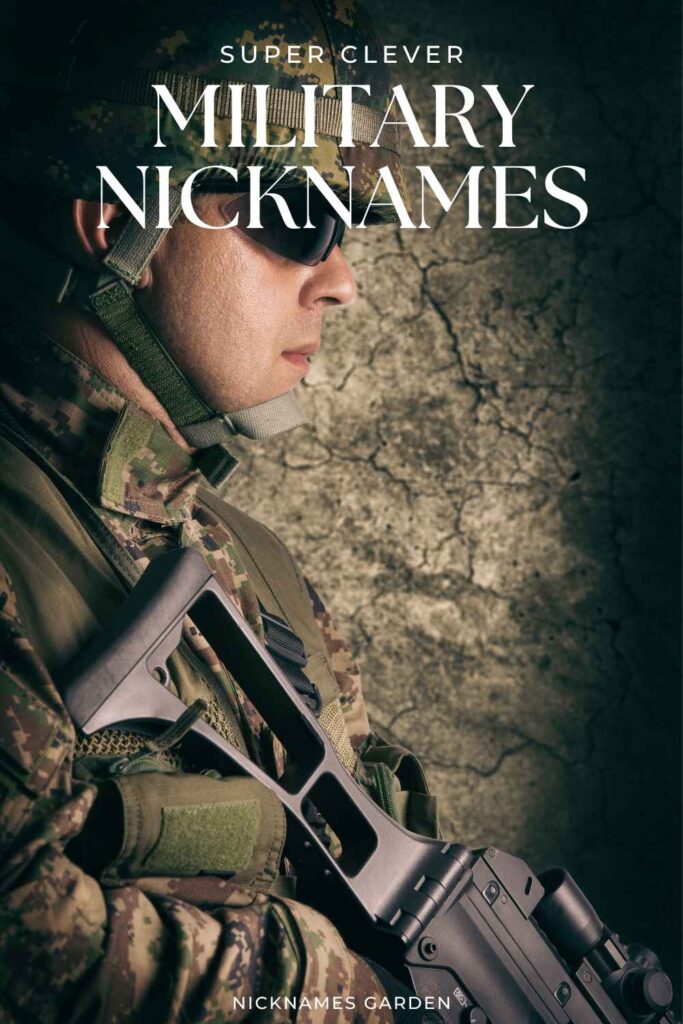Military nicknames carry rich histories and signify camaraderie and identity among service members.
This guide explores over 145 military nicknames, categorized by branch, rank, role, and more, highlighting their origins and meanings.
Dive into the fascinating world of military monikers and discover the unique stories behind each one.
General Military Nicknames
Military personnel often develop unique nicknames that reflect their roles, experiences, and camaraderie.
These general nicknames are widely used across various branches of the military, creating a sense of unity and shared identity among servicemembers.
Here are some of the most common general military nicknames:
- GI
- Origin: “GI” stands for “Government Issue” or “General Infantry.” It was initially used to describe equipment issued to soldiers but eventually became a term for the soldiers themselves.
- Perfect For: Any enlisted soldier, especially those in the Army.
- Grunt
- Origin: A term commonly used during the Vietnam War to refer to infantry soldiers. It highlights the tough, gritty nature of their work.
- Perfect For: Infantry soldiers who endure the harsh realities of ground combat.
- Trooper
- Origin: Derived from “troop,” referring to a group of soldiers. It emphasizes the collective spirit of military units.
- Perfect For: Soldiers who demonstrate teamwork and camaraderie.
- Jarhead
- Origin: A nickname for Marines, referring to their high and tight haircuts that resemble the shape of a jar.
- Perfect For: Members of the Marine Corps.
- Leatherneck
- Origin: Another nickname for Marines, originating from the leather collars worn by Marines in the 18th century to protect their necks from sword slashes.
- Perfect For: Marines, especially those who appreciate the historical roots of their branch.
- Zoomie
- Origin: A playful nickname for Air Force personnel, referring to their association with high-speed aircraft and flight.
- Perfect For: Air Force servicemembers, particularly pilots.
- Squid
- Origin: A nickname for Navy sailors, thought to be derived from their association with the sea and marine life.
- Perfect For: Members of the Navy.
- Swabbie
- Origin: Another term for Navy sailors, referring to the act of swabbing (cleaning) the decks of a ship.
- Perfect For: Navy sailors who take pride in their shipboard duties.
- Flyboy
- Origin: A term for Air Force pilots, emphasizing their role in flying aircraft.
- Perfect For: Pilots and aviation enthusiasts in the Air Force.
- Dogface
- Origin: A nickname for Army infantry soldiers, particularly during World War II. It reflects the rugged and enduring spirit of these soldiers.
- Perfect For: Infantry soldiers in the Army.
These general military nicknames showcase the diverse and colorful language that servicemembers use to describe themselves and their comrades.
Each nickname carries its own unique story and significance, contributing to the rich tapestry of military culture.
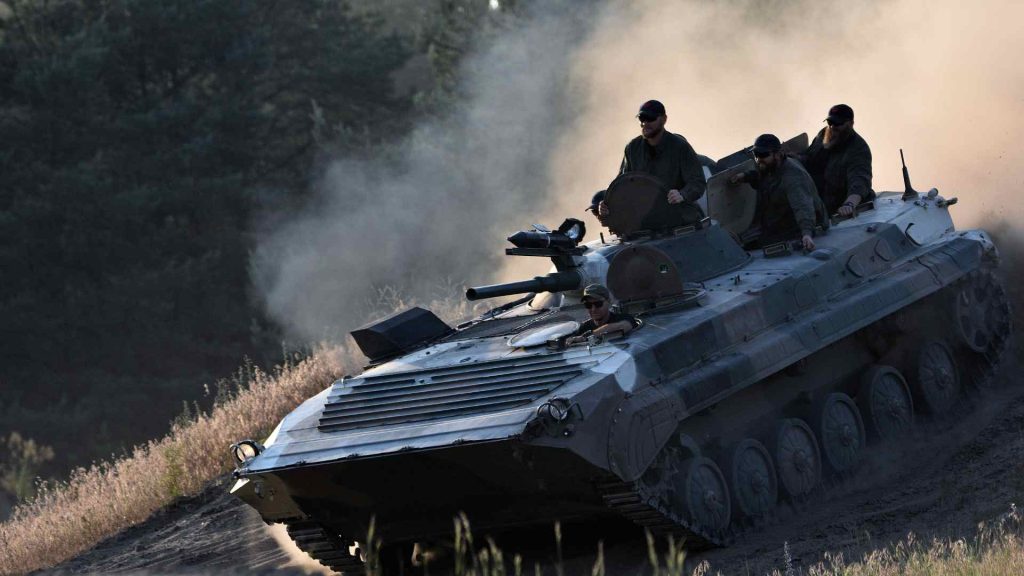
Branch-Specific Nicknames
Military branches have their own unique cultures and traditions, reflected in the nicknames given to their members.
Here, we explore branch-specific nicknames for the Army, Navy, Air Force, Marine Corps, and Coast Guard.
Army
- Doughboy
- Origin: Used during World War I to refer to American infantrymen. The term’s exact origin is debated, but it may relate to the dough-like appearance of their uniforms after marching through muddy fields.
- Perfect For: Army infantrymen with a sense of history.
- Dogface
- Origin: Commonly used during World War II, this nickname reflects the tough, determined spirit of Army soldiers.
- Perfect For: Army infantry soldiers.
- Ground Pounder
- Origin: Refers to Army soldiers who operate on foot, highlighting their role in ground combat.
- Perfect For: Infantry soldiers who engage in heavy ground combat.
- Tanker
- Origin: Used for soldiers who operate tanks. It emphasizes their expertise in armored warfare.
- Perfect For: Soldiers in armored divisions.
- Cavalry
- Origin: Historically referred to horse-mounted soldiers, now used for those in armored reconnaissance units.
- Perfect For: Members of the Army cavalry units.
- Squid
- Origin: A nickname for Navy sailors, thought to be derived from their association with the sea and marine life.
- Perfect For: Navy sailors.
- Swabbie
- Origin: Refers to Navy sailors, particularly those responsible for cleaning the ship’s deck.
- Perfect For: Sailors who take pride in shipboard duties.
- Bubblehead
- Origin: Used for submariners, referring to the pressurized environment they work in.
- Perfect For: Submarine crew members.
- Frogman
- Origin: Refers to Navy SEALs and underwater demolition teams. Emphasizes their amphibious capabilities.
- Perfect For: Navy SEALs and divers.
- Blackshoe
- Origin: Used for surface warfare officers, distinguishing them from aviators who are called “Brownshoes.”
- Perfect For: Surface warfare officers.
Air Force
- Zoomie
- Origin: A playful nickname for Air Force personnel, referring to their association with high-speed aircraft.
- Perfect For: Air Force servicemembers, particularly pilots.
- Flyboy
- Origin: A term for Air Force pilots, emphasizing their role in flying aircraft.
- Perfect For: Pilots and aviation enthusiasts.
- Blue Suiter
- Origin: Refers to Air Force members due to their distinctive blue uniforms.
- Perfect For: Air Force personnel.
- Wingnut
- Origin: A term for Air Force personnel, playing on the “wing” aspect of their branch.
- Perfect For: Air Force members with a sense of humor.
- Jet Jockey
- Origin: Refers to pilots who fly jets, emphasizing their skill and speed.
- Perfect For: Jet pilots in the Air Force.
Marine Corps
- Jarhead
- Origin: Refers to Marines, named for their high and tight haircuts resembling the shape of a jar.
- Perfect For: Members of the Marine Corps.
- Leatherneck
- Origin: A nickname for Marines, originating from the leather collars worn by Marines in the 18th century.
- Perfect For: Marines who appreciate the historical roots of their branch.
- Devil Dog
- Origin: Allegedly coined by German soldiers in World War I to describe the ferociousness of U.S. Marines.
- Perfect For: Marines known for their toughness.
- Gyrene
- Origin: An old term for Marines, blending “GI” and “Marine.”
- Perfect For: Traditionalists within the Marine Corps.
- Bullet Sponge
- Origin: Humorous term for infantry Marines who often find themselves in heavy combat.
- Perfect For: Infantry Marines.
Coast Guard
- Coastie
- Origin: A simple and affectionate term for Coast Guard personnel.
- Perfect For: Members of the Coast Guard.
- Puddle Pirate
- Origin: Refers to Coast Guard personnel, playing on their duties in shallow waters.
- Perfect For: Coast Guard members with a sense of humor.
- Guardian
- Origin: Refers to the protective and rescue roles of the Coast Guard.
- Perfect For: Coast Guard members dedicated to saving lives.
- Salty Dog
- Origin: Refers to experienced sailors in the Coast Guard.
- Perfect For: Veteran Coast Guard personnel.
- Skimmer
- Origin: A term for Coast Guard personnel who operate small boats.
- Perfect For: Boat operators in the Coast Guard.
Additional Branch-Specific Nicknames
- Bullet Catcher
- Origin: A humorous term for infantry soldiers across branches.
- Perfect For: Any infantry soldier.
- Sky Pilot
- Origin: A term for military chaplains, playing on the “pilot” aspect as spiritual guides.
- Perfect For: Military chaplains.
- Shavetail
- Origin: Refers to newly commissioned officers, originally used for young mules in training.
- Perfect For: New officers in any branch.
- Mustang
- Origin: A term for enlisted personnel who have risen to officer rank.
- Perfect For: Prior-enlisted officers.
- Fister
- Origin: Refers to forward observers in artillery units, playing on the “FIST” acronym (Fire Support Team).
- Perfect For: Artillery forward observers.
- Tanker
- Origin: A common term for soldiers who operate tanks, emphasizing their armored capabilities.
- Perfect For: Tank operators.
- Boom Operator
- Origin: Refers to Air Force personnel responsible for aerial refueling operations.
- Perfect For: Aerial refueling specialists.
- EOD Tech
- Origin: Short for Explosive Ordnance Disposal Technician, emphasizing their expertise in handling explosives.
- Perfect For: Explosive ordnance disposal personnel.
- Wizzo
- Origin: A term for Weapon Systems Officers, particularly in fighter jets.
- Perfect For: Weapon systems officers.
- Rotorhead
- Origin: Refers to helicopter pilots and crew members.
- Perfect For: Helicopter operators.
These branch-specific nicknames highlight the distinct cultures and traditions within each branch of the military, offering a glimpse into the unique identities of servicemembers.
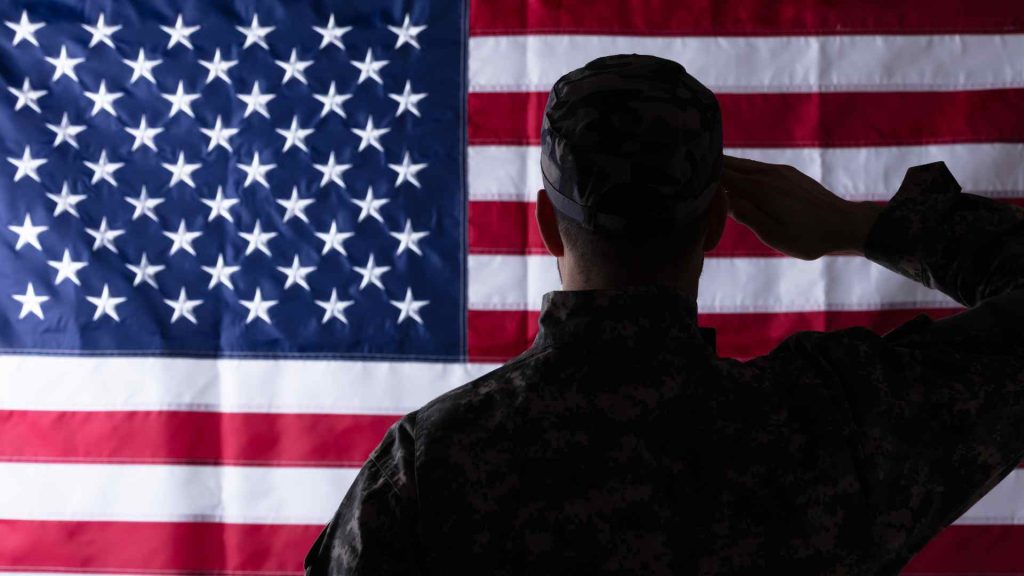
Rank-Based Nicknames
Military ranks come with their own set of responsibilities, and often, nicknames emerge that reflect these roles and the respect (or camaraderie) associated with them.
Here are some popular rank-based military nicknames:
- Top
- Origin: A nickname for a Master Sergeant, the senior non-commissioned officer in a company, highlighting their leadership position.
- Perfect For: Master Sergeants in the Army.
- Gunny
- Origin: Short for Gunnery Sergeant, a senior non-commissioned officer in the Marine Corps.
- Perfect For: Gunnery Sergeants in the Marine Corps.
- Bird Colonel
- Origin: Refers to a full Colonel, distinguishing them from a Lieutenant Colonel. The “bird” refers to the eagle insignia.
- Perfect For: Full Colonels in any branch.
- Butter Bar
- Origin: A nickname for a Second Lieutenant, referring to the gold bar insignia worn by this rank.
- Perfect For: Second Lieutenants.
- Full Bird
- Origin: Another term for a full Colonel, emphasizing the eagle insignia worn by this rank.
- Perfect For: Full Colonels.
- Mustang
- Origin: A term for officers who were previously enlisted, reflecting their experience and transition.
- Perfect For: Prior-enlisted officers in any branch.
- LT
- Origin: Short for Lieutenant, used across branches to refer to officers at this rank.
- Perfect For: Lieutenants.
- Major Pain
- Origin: A playful nickname for Majors, playing on the word “pain” to emphasize their authority and strictness.
- Perfect For: Majors with a tough demeanor.
- Chief
- Origin: Used for Chief Petty Officers in the Navy and Coast Guard, highlighting their senior non-commissioned rank.
- Perfect For: Chief Petty Officers.
- Sergeant Major
- Origin: A term for the highest-ranking enlisted soldier in a unit, emphasizing their seniority and leadership.
- Perfect For: Sergeants Major.
- Captain Crunch
- Origin: A humorous nickname for Captains, playing on the cereal brand name.
- Perfect For: Captains with a sense of humor.
- Colonel Sanders
- Origin: A playful term for Colonels, referencing the famous founder of KFC.
- Perfect For: Colonels who don’t mind the association.
- Old Man
- Origin: Informal term for the commanding officer, often used with respect.
- Perfect For: Senior officers or commanding officers.
- The Old Man of the Sea
- Origin: A term for a senior Navy Captain, referencing the literary character and emphasizing their experience.
- Perfect For: Senior Navy Captains.
- First Shirt
- Origin: A term for First Sergeants, referring to their senior enlisted role in a company.
- Perfect For: First Sergeants.
- Skipper
- Origin: A term for the commanding officer of a ship or unit, emphasizing their leadership.
- Perfect For: Ship captains and unit commanders.
- XO
- Origin: Short for Executive Officer, the second-in-command in a unit.
- Perfect For: Executive Officers.
- Platoon Daddy
- Origin: A term for the senior non-commissioned officer in charge of a platoon, highlighting their paternal role.
- Perfect For: Platoon Sergeants.
- Ensign
- Origin: Refers to the lowest commissioned officer rank in the Navy and Coast Guard.
- Perfect For: New naval officers.
- Commander
- Origin: A term for officers in command roles, particularly in the Navy and Coast Guard.
- Perfect For: Commanding officers.
- Lieutenant Commander
- Origin: A rank above Lieutenant and below Commander, primarily used in the Navy and Coast Guard.
- Perfect For: Mid-level officers in the Navy and Coast Guard.
- Brass
- Origin: Informal term for high-ranking officers, derived from the brass insignia they wear.
- Perfect For: High-ranking officers across branches.
- Field Grade
- Origin: Refers to Majors, Lieutenant Colonels, and Colonels, emphasizing their leadership at the field level.
- Perfect For: Mid- to high-level officers.
- General
- Origin: The highest officer rank, commanding large units or entire branches.
- Perfect For: The highest-ranking officers.
- Admiral
- Origin: The highest officer rank in the Navy and Coast Guard, commanding fleets and naval operations.
- Perfect For: Top-ranking naval officers.
- Padre
- Origin: Informal term for military chaplains, emphasizing their spiritual role.
- Perfect For: Chaplains.
- The Brass Hat
- Origin: Another term for high-ranking officers, referencing their distinguished headgear.
- Perfect For: Senior officers.
- Old Man River
- Origin: A respectful term for a long-serving, experienced senior officer.
- Perfect For: Veteran senior officers.
- Brigadier
- Origin: A term for a Brigadier General, a rank above Colonel and below Major General.
- Perfect For: Brigadier Generals.
- Field Marshal
- Origin: The highest rank in some foreign militaries, equivalent to a five-star General.
- Perfect For: Top-ranking officers in foreign militaries.
These rank-based nicknames reflect the hierarchy, respect, and camaraderie within the military, highlighting the unique roles and responsibilities of each rank.
Job/Role-Specific Nicknames
Military personnel often receive nicknames based on their specific roles or jobs within their units.
These nicknames reflect the unique skills and duties associated with various positions.
Here are some job/role-specific military nicknames:
- Doc
- Origin: Refers to medics or corpsmen, emphasizing their role in providing medical care.
- Perfect For: Medical personnel in the military.
- Gunner
- Origin: Used for soldiers who operate guns or artillery, highlighting their expertise in weaponry.
- Perfect For: Artillery and machine gun operators.
- Pilot
- Origin: A straightforward term for those who fly aircraft.
- Perfect For: Aviators and pilots in any branch.
- Sniper
- Origin: Refers to marksmen who are trained in precision shooting.
- Perfect For: Expert marksmen.
- RTO (Radio Telephone Operator)
- Origin: Refers to soldiers who manage communications equipment.
- Perfect For: Communications specialists.
- Tank Commander
- Origin: A term for the leader of a tank crew, emphasizing their command role.
- Perfect For: Tank commanders.
- EOD (Explosive Ordnance Disposal) Tech
- Origin: Refers to specialists trained to handle and dispose of explosives.
- Perfect For: Bomb disposal experts.
- Quartermaster
- Origin: A term for personnel responsible for supply and logistics.
- Perfect For: Logistics and supply officers.
- Chopper
- Origin: Refers to helicopter pilots and crew members.
- Perfect For: Helicopter operators.
- Radioman
- Origin: A term for personnel who handle radio communications.
- Perfect For: Communications specialists.
- Seabee
- Origin: Refers to members of the Navy Construction Battalion (CB), emphasizing their role in construction.
- Perfect For: Navy construction personnel.
- Ranger
- Origin: Refers to Army Rangers, elite soldiers trained for rapid deployment and special operations.
- Perfect For: Members of the Army Rangers.
- Paratrooper
- Origin: A term for soldiers trained to parachute into combat.
- Perfect For: Airborne soldiers.
- Corpsman
- Origin: A Navy term for medical personnel who serve with Marine units.
- Perfect For: Navy medical personnel attached to Marine units.
- Signalman
- Origin: Refers to those who manage military communications and signals.
- Perfect For: Communications personnel.
- MP (Military Police)
- Origin: Refers to personnel responsible for law enforcement within the military.
- Perfect For: Military police officers.
- Pathfinder
- Origin: A term for soldiers who lead the way and set up drop zones or landing zones for paratroopers.
- Perfect For: Advanced reconnaissance soldiers.
- Scout
- Origin: Refers to soldiers who perform reconnaissance and gather intelligence.
- Perfect For: Reconnaissance specialists.
- Sapper
- Origin: A term for combat engineers trained in demolitions and fortifications.
- Perfect For: Combat engineers.
- Boom Operator
- Origin: Refers to Air Force personnel who manage aerial refueling operations.
- Perfect For: Aerial refueling specialists.
- Gunsmith
- Origin: Refers to personnel responsible for maintaining and repairing firearms.
- Perfect For: Armory specialists.
- Loadmaster
- Origin: A term for those who manage the loading and unloading of aircraft cargo.
- Perfect For: Air Force logistics personnel.
- Crew Chief
- Origin: Refers to the senior enlisted person responsible for managing aircraft maintenance crews.
- Perfect For: Aircraft maintenance leaders.
- Bombardier
- Origin: Refers to personnel responsible for aiming and releasing bombs from aircraft.
- Perfect For: Bomber aircraft crew members.
- Navigator
- Origin: A term for those who plot courses and direct navigation for military vehicles and vessels.
- Perfect For: Navigation specialists.
- Gunfighter
- Origin: Refers to fighter pilots, emphasizing their combat role.
- Perfect For: Fighter pilots.
- Cyber Warrior
- Origin: A modern term for personnel engaged in cyber warfare and defense.
- Perfect For: Cybersecurity specialists.
- Loady
- Origin: A nickname for Loadmasters, those who oversee the loading of cargo onto aircraft.
- Perfect For: Air Force logistics personnel.
- Boomer
- Origin: Refers to personnel on nuclear submarines responsible for missile operations.
- Perfect For: Submarine missile operators.
- Combat Controller
- Origin: A term for Air Force personnel who coordinate air support for ground troops.
- Perfect For: Air Force tactical air controllers.
These job/role-specific nicknames highlight the diverse and specialized roles within the military, reflecting the unique skills and duties of servicemembers in various positions.

Nickname Origins and Meanings
Understanding the origins and meanings behind military nicknames adds depth and context to these terms, highlighting their historical and cultural significance.
Here are some popular military nicknames along with their origins and meanings:
- Jarhead
- Origin: This nickname for Marines originated from the high and tight haircuts that resemble the shape of a jar.
- Meaning: Reflects the distinct and disciplined appearance of Marine Corps members.
- Leatherneck
- Origin: Stems from the leather collars worn by Marines in the 18th century to protect their necks from sword slashes.
- Meaning: Emphasizes the historical roots and toughness of Marines.
- Grunt
- Origin: Popularized during the Vietnam War, referring to infantry soldiers who endure the hardest and dirtiest work.
- Meaning: Highlights the rugged and enduring nature of ground troops.
- Squid
- Origin: A playful term for Navy sailors, possibly derived from their association with the sea and marine life.
- Meaning: Reflects the seafaring nature and camaraderie of Navy personnel.
- Zoomie
- Origin: A playful nickname for Air Force personnel, referring to their association with high-speed aircraft and flight.
- Meaning: Highlights the fast-paced and airborne aspects of Air Force life.
- Top
- Origin: A nickname for Master Sergeants, who are the senior non-commissioned officers in a company.
- Meaning: Denotes leadership and respect within the enlisted ranks.
- Doc
- Origin: Refers to medics and corpsmen, emphasizing their critical role in providing medical care to troops.
- Meaning: Conveys trust and reliance on medical personnel.
- Frogman
- Origin: Used for Navy SEALs and underwater demolition teams, highlighting their amphibious capabilities.
- Meaning: Emphasizes the specialized and elite nature of these units.
- Gyrene
- Origin: An older term for Marines, blending “GI” (Government Issue) and “Marine.”
- Meaning: Reflects a traditional view of Marine Corps members.
- Doughboy
- Origin: Used during World War I to refer to American infantrymen, possibly due to the dough-like appearance of their uniforms after marching through muddy fields.
- Meaning: Highlights the historical and rugged nature of World War I soldiers.
- Leatherneck
- Origin: Refers to the leather collars worn by Marines in the 18th century to protect against sword slashes.
- Meaning: Symbolizes the toughness and historical heritage of the Marine Corps.
- Devil Dog
- Origin: Allegedly coined by German soldiers in World War I to describe the ferocity of U.S. Marines.
- Meaning: Reflects the fearsome reputation and fighting spirit of the Marines.
- Mustang
- Origin: A term for enlisted personnel who rise to officer rank, reflecting their diverse experience.
- Meaning: Denotes respect for those who have climbed the ranks through hard work.
- Ground Pounder
- Origin: Refers to infantry soldiers who operate on foot, highlighting their role in ground combat.
- Meaning: Emphasizes the challenging and essential nature of infantry work.
- Sky Pilot
- Origin: A term for military chaplains, playing on the “pilot” aspect as spiritual guides.
- Meaning: Reflects the supportive and guiding role of chaplains.
- Bubblehead
- Origin: A nickname for submariners, referring to the pressurized environment they work in.
- Meaning: Emphasizes the unique and challenging nature of submarine service.
- Boom Operator
- Origin: Refers to Air Force personnel responsible for aerial refueling operations.
- Meaning: Highlights the critical support role in maintaining air operations.
- Quartermaster
- Origin: A term for personnel responsible for supply and logistics.
- Meaning: Denotes the essential role of logistics in military operations.
- Top
- Origin: Short for “Top Sergeant,” referring to senior non-commissioned officers like Master Sergeants.
- Meaning: Conveys authority and leadership within the enlisted ranks.
- The Brass
- Origin: Informal term for high-ranking officers, derived from the brass insignia they wear.
- Meaning: Reflects the authority and decision-making power of senior officers.
- Old Man
- Origin: A respectful term for the commanding officer, often used by enlisted personnel.
- Meaning: Denotes leadership and respect for the senior officer.
- Padre
- Origin: Informal term for military chaplains, emphasizing their spiritual and supportive role.
- Meaning: Reflects the chaplain’s role in providing moral and spiritual guidance.
- Field Marshal
- Origin: The highest rank in some foreign militaries, equivalent to a five-star General.
- Meaning: Represents the pinnacle of military leadership and strategy.
- Shavetail
- Origin: Refers to newly commissioned officers, originally used for young mules in training.
- Meaning: Highlights the inexperience and learning curve of new officers.
- Top Kick
- Origin: A term for the senior enlisted person in a unit, often used for First Sergeants.
- Meaning: Denotes leadership and responsibility within the enlisted ranks.
- Gunny
- Origin: Short for Gunnery Sergeant, a senior non-commissioned officer in the Marine Corps.
- Meaning: Reflects the respect and authority of this rank.
- Boot
- Origin: Refers to new recruits or those fresh out of basic training.
- Meaning: Emphasizes inexperience and the early stages of military service.
- Zoomie
- Origin: A playful nickname for Air Force personnel, referring to their association with high-speed aircraft.
- Meaning: Highlights the fast-paced and airborne aspects of Air Force life.
- Sniper
- Origin: Refers to marksmen who are trained in precision shooting.
- Meaning: Emphasizes skill and precision in marksmanship.
- Ranger
- Origin: Refers to Army Rangers, elite soldiers trained for rapid deployment and special operations.
- Meaning: Denotes elite status and specialized training.
These origins and meanings provide a deeper understanding of military nicknames, illustrating the rich history and culture within the armed forces.
Historical Military Nicknames
Throughout history, military nicknames have captured the essence of different eras and conflicts.
These nicknames often reflect the unique characteristics and experiences of soldiers during specific wars and historical periods.
Here are some historical military nicknames:
- Doughboy
- Origin: Used during World War I to refer to American infantrymen. The term’s exact origin is debated, but it may relate to the dough-like appearance of their uniforms after marching through muddy fields.
- Perfect For: World War I infantry soldiers.
- Tommy
- Origin: A term for British soldiers during World War I and World War II, derived from “Tommy Atkins,” a generic name used on sample forms in the British Army.
- Perfect For: British soldiers with a sense of historical pride.
- Devil Dog
- Origin: Allegedly coined by German soldiers in World War I to describe the ferocity of U.S. Marines.
- Perfect For: U.S. Marines known for their fighting spirit.
- Fritz
- Origin: A nickname for German soldiers during World War I and World War II, based on a common German name.
- Perfect For: Historical references to German soldiers.
- GI Joe
- Origin: Popularized during World War II, “GI” stands for “Government Issue” and “Joe” represents the average American soldier.
- Perfect For: World War II American soldiers.
- Flyboy
- Origin: A term for pilots during World War II, emphasizing their role in the air war.
- Perfect For: WWII pilots and aviation enthusiasts.
- Leatherneck
- Origin: Refers to the leather collars worn by Marines in the 18th century to protect against sword slashes.
- Perfect For: Marines with a sense of historical tradition.
- Redcoat
- Origin: A term for British soldiers during the American Revolutionary War, referring to their distinctive red uniforms.
- Perfect For: Historical references to British soldiers.
- Yank
- Origin: Short for “Yankee,” a term used during the American Civil War to refer to Union soldiers.
- Perfect For: Union soldiers from the Civil War era.
- Reb
- Origin: Short for “Rebel,” a term used during the American Civil War to refer to Confederate soldiers.
- Perfect For: Confederate soldiers from the Civil War era.
- Swabbie
- Origin: Refers to Navy sailors, particularly those responsible for cleaning the ship’s deck, popularized during World War II.
- Perfect For: WWII Navy sailors.
- Dogface
- Origin: Commonly used during World War II, this nickname reflects the tough, determined spirit of Army soldiers.
- Perfect For: WWII Army infantry soldiers.
- Jarhead
- Origin: Refers to Marines, named for their high and tight haircuts resembling the shape of a jar.
- Perfect For: Marines with a sense of historical pride.
- WAC
- Origin: Stands for “Women’s Army Corps,” referring to female soldiers who served during World War II.
- Perfect For: Female soldiers from the WWII era.
- Zoomie
- Origin: A playful nickname for Air Force personnel, referring to their association with high-speed aircraft, popularized during the Cold War.
- Perfect For: Air Force personnel from the Cold War era.
- FNG (F*ing New Guy)**
- Origin: A term used during the Vietnam War to refer to new soldiers arriving in the field.
- Perfect For: Vietnam War soldiers.
- Tunnel Rat
- Origin: Refers to soldiers in the Vietnam War who performed underground search and destroy missions in enemy tunnels.
- Perfect For: Vietnam War soldiers known for their bravery.
- Brownshoe
- Origin: A term for Navy and Marine Corps aviators, distinguishing them from “Blackshoe” surface warfare officers.
- Perfect For: Aviators from the WWII and post-war eras.
- Sky Soldier
- Origin: A term for paratroopers, popularized during World War II.
- Perfect For: WWII paratroopers.
- Tin Can Sailor
- Origin: Refers to sailors who served on destroyers, known as “tin cans” due to their thin armor.
- Perfect For: WWII destroyer crew members.
- Grunt
- Origin: Popularized during the Vietnam War, referring to infantry soldiers who endure the hardest and dirtiest work.
- Perfect For: Vietnam War infantry soldiers.
- Seabee
- Origin: Refers to members of the Navy Construction Battalion (CB), emphasizing their role in construction during World War II.
- Perfect For: WWII Navy construction personnel.
- Bluecoat
- Origin: A term for Union soldiers during the American Civil War, referring to their blue uniforms.
- Perfect For: Union soldiers from the Civil War era.
- Redleg
- Origin: A term for artillerymen, originating from the red stripe on their uniform trousers during the Civil War.
- Perfect For: Artillery soldiers from historical periods.
- Buffalo Soldier
- Origin: Refers to African-American cavalry soldiers who served on the Western frontier after the Civil War.
- Perfect For: Historical references to African-American soldiers.
- Zulu
- Origin: A nickname for British soldiers in colonial Africa, referencing the Zulu Wars.
- Perfect For: Historical references to British soldiers in Africa.
- Cossack
- Origin: A term for Russian cavalry soldiers known for their fierce fighting skills.
- Perfect For: Historical references to Russian cavalry.
- Hessian
- Origin: Refers to German mercenaries hired by the British during the American Revolutionary War.
- Perfect For: Historical references to German soldiers.
- Knight
- Origin: A term for medieval European soldiers known for their armor and chivalry.
- Perfect For: Historical references to medieval soldiers.
- Legionnaire
- Origin: Refers to soldiers of the French Foreign Legion, known for their elite status and rigorous training.
- Perfect For: Members of the French Foreign Legion.
- Musketeer
- Origin: A term for soldiers equipped with muskets during the 17th and 18th centuries.
- Perfect For: Historical references to early modern soldiers.
- Samurai
- Origin: Refers to the warrior class of feudal Japan, known for their martial skills and code of honor.
- Perfect For: Historical references to Japanese warriors.
- Spartan
- Origin: A term for soldiers from the ancient Greek city-state of Sparta, known for their discipline and combat prowess.
- Perfect For: Historical references to ancient Greek warriors.
- Viking
- Origin: Refers to Norse warriors known for their seafaring raids during the Viking Age.
- Perfect For: Historical references to Scandinavian warriors.
- Centurion
- Origin: A term for officers in the Roman legions, commanding a century (100 soldiers).
- Perfect For: Historical references to Roman soldiers.
- Knight Templar
- Origin: Refers to members of the medieval Christian military order known for their role in the Crusades.
- Perfect For: Historical references to Crusader knights.
- Dragoon
- Origin: A term for mounted infantry who could fight on foot or horseback, used during the 17th and 18th centuries.
- Perfect For: Historical references to versatile soldiers.
- Highlander
- Origin: Refers to Scottish soldiers from the Highland regiments, known for their distinctive kilts and fierce fighting.
- Perfect For: Historical references to Scottish warriors.
- Crusader
- Origin: A term for soldiers who participated in the medieval Crusades to the Holy Land.
- Perfect For: Historical references to medieval European warriors.
- Green Beret
- Origin: A nickname for U.S. Army Special Forces, popularized during the Vietnam War.
- Perfect For: Special Forces soldiers.
These historical military nicknames offer a fascinating glimpse into the past, highlighting the unique characteristics and experiences of soldiers from different eras and conflicts.
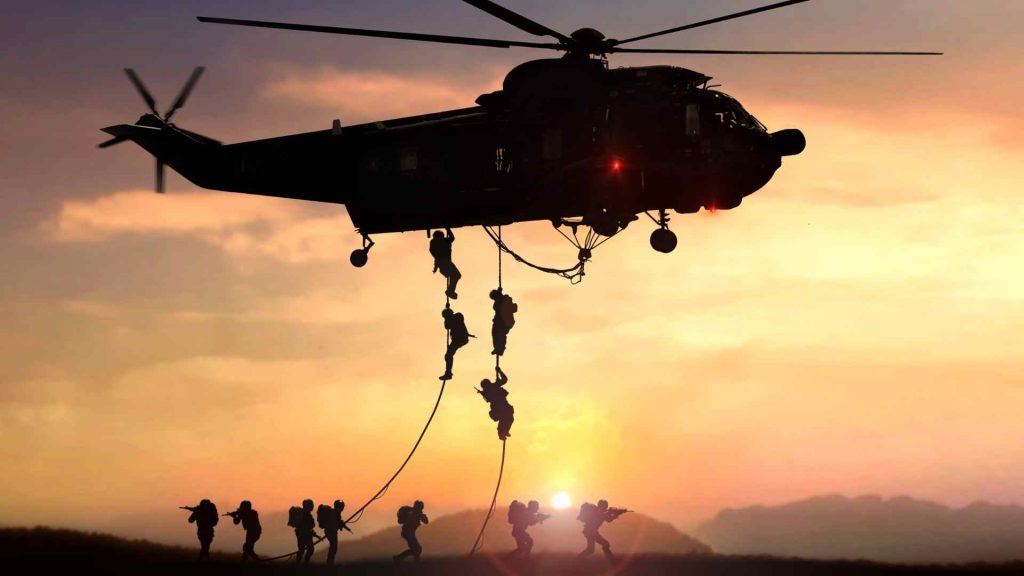
International Military Nicknames
Different countries have their own unique military cultures and traditions, which are often reflected in the nicknames given to their servicemembers.
Here are some international military nicknames:
British Military
- Tommy
- Origin: A term for British soldiers, derived from “Tommy Atkins,” a generic name used on sample forms in the British Army.
- Perfect For: British soldiers with a sense of historical pride.
- Limey
- Origin: Originally used to refer to British sailors, derived from the practice of issuing lime juice to prevent scurvy.
- Perfect For: British naval personnel.
- Jock
- Origin: A term for soldiers from Scotland, based on a common Scottish nickname.
- Perfect For: Scottish soldiers.
- Pongo
- Origin: A slang term for soldiers in the British Army, possibly derived from a song lyric.
- Perfect For: British Army soldiers.
- Bootneck
- Origin: A nickname for Royal Marines, referencing the leather neckbands they historically wore.
- Perfect For: Royal Marines.
Australian Military
- Digger
- Origin: A term for Australian and New Zealand soldiers, originating from the trenches of World War I.
- Perfect For: Australian and New Zealand soldiers.
- Roo
- Origin: Short for “Kangaroo,” used to refer to Australian soldiers, playing on their national animal.
- Perfect For: Australian military personnel.
- Aussie
- Origin: A general term for Australian soldiers.
- Perfect For: Australian military personnel.
Canadian Military
- Canuck
- Origin: A nickname for Canadians, used affectionately by Canadian soldiers.
- Perfect For: Canadian military personnel.
- Mountie
- Origin: Refers to members of the Royal Canadian Mounted Police, known for their distinctive uniforms.
- Perfect For: Canadian military police.
- Moose
- Origin: A nickname used for Canadian soldiers, playing on the iconic Canadian animal.
- Perfect For: Canadian military personnel.
German Military
- Fritz
- Origin: A nickname for German soldiers, based on a common German name.
- Perfect For: Historical references to German soldiers.
- Jerry
- Origin: Used by Allied soldiers during World War II to refer to German soldiers, derived from “German.”
- Perfect For: Historical references to German soldiers.
Russian Military
- Ivan
- Origin: A common Russian name used to refer to Russian soldiers, particularly during the Cold War.
- Perfect For: Russian military personnel.
- Vanya
- Origin: A diminutive form of Ivan, used informally for Russian soldiers.
- Perfect For: Russian military personnel.
French Military
- Poilu
- Origin: A term for French infantrymen during World War I, meaning “hairy one,” symbolizing their ruggedness.
- Perfect For: French infantry soldiers.
- Légionnaire
- Origin: Refers to members of the French Foreign Legion, known for their elite status and rigorous training.
- Perfect For: Members of the French Foreign Legion.
Italian Military
- Bersagliere
- Origin: A term for members of an elite unit of the Italian Army known for their marksmanship and rapid mobility.
- Perfect For: Italian military sharpshooters.
- Alpini
- Origin: Refers to Italian mountain troops, known for their skills in alpine warfare.
- Perfect For: Italian mountain soldiers.
Japanese Military
- Samurai
- Origin: Refers to the warrior class of feudal Japan, known for their martial skills and code of honor.
- Perfect For: Historical references to Japanese warriors.
- Ninja
- Origin: Refers to covert agents in feudal Japan known for espionage and guerrilla warfare.
- Perfect For: Historical references to Japanese covert operatives.
Chinese Military
- Dragon
- Origin: Refers to Chinese soldiers, playing on the cultural significance of dragons in China.
- Perfect For: Chinese military personnel.
- PLA (People’s Liberation Army)
- Origin: Refers to members of the Chinese military.
- Perfect For: Chinese soldiers.
Israeli Military
- Sabra
- Origin: A term for native-born Israelis, used affectionately for Israeli soldiers.
- Perfect For: Israeli military personnel.
- Tzanchanim
- Origin: Refers to Israeli paratroopers.
- Perfect For: Israeli airborne soldiers.
Indian Military
- Fauji
- Origin: A colloquial term for soldiers in India, derived from the Hindi word for soldier.
- Perfect For: Indian military personnel.
- Sepoy
- Origin: A historical term for Indian infantrymen during British colonial rule.
- Perfect For: Historical references to Indian soldiers.
South African Military
- Springbok
- Origin: A term for South African soldiers, playing on the national animal.
- Perfect For: South African military personnel.
- Troopie
- Origin: An informal term for soldiers in South Africa.
- Perfect For: South African military personnel.
Brazilian Military
- Carioca
- Origin: Refers to residents of Rio de Janeiro, used informally for Brazilian soldiers.
- Perfect For: Brazilian military personnel.
- Jungle Fighter
- Origin: Refers to Brazilian soldiers trained for operations in the Amazon rainforest.
- Perfect For: Brazilian jungle warfare specialists.
These international military nicknames highlight the diverse and rich military traditions from around the world, reflecting the unique cultures and histories of different countries’ armed forces.
Acronyms and Slang
The military is known for its extensive use of acronyms and slang, which often evolve into nicknames.
These terms are not only practical for communication but also serve to build camaraderie and a shared identity among servicemembers.
Here are some popular acronyms and slang used as military nicknames:
- FNG (F*ing New Guy)**
- Origin: A term used to refer to new soldiers who have just arrived in the field, particularly popularized during the Vietnam War.
- Perfect For: New recruits or recently deployed soldiers.
- SNAFU (Situation Normal, All Fouled Up)
- Origin: A sarcastic term describing the constant state of chaos and confusion in the military.
- Perfect For: Describing chaotic situations or soldiers who thrive in them.
- AWOL (Absent Without Leave)
- Origin: Refers to a soldier who is absent from their post without official permission.
- Perfect For: Soldiers known for being unpredictable or disappearing.
- POG (Person Other than Grunt)
- Origin: A term used by infantrymen to describe support personnel who are not directly engaged in combat.
- Perfect For: Non-infantry soldiers or support staff.
- REMF (Rear Echelon Mother F*er)**
- Origin: A derogatory term used by frontline soldiers to refer to those stationed in safer, rear areas.
- Perfect For: Soldiers in non-combat roles.
- MRE (Meals Ready to Eat)
- Origin: Refers to the pre-packaged meals provided to soldiers in the field, sometimes used to describe someone who is always ready.
- Perfect For: Soldiers who are always prepared.
- Scuttlebutt
- Origin: Navy slang for gossip or rumors, originally referring to the water cooler on a ship where sailors would talk.
- Perfect For: Sailors or soldiers known for spreading news.
- G.I. (Government Issue)
- Origin: Originally referred to equipment issued to soldiers, later became a general term for U.S. servicemembers.
- Perfect For: U.S. military personnel.
- Hooah
- Origin: A motivational cry used in the Army, representing high morale and motivation.
- Perfect For: Enthusiastic soldiers.
- Semper Fi
- Origin: Short for “Semper Fidelis,” the Marine Corps motto meaning “Always Faithful.”
- Perfect For: Marines with strong loyalty and commitment.
- Bravo Zulu (BZ)
- Origin: Naval signal meaning “Well Done,” used to commend excellent performance.
- Perfect For: Recognizing outstanding achievement.
- Jody
- Origin: Refers to the civilian men who allegedly woo soldiers’ significant others while they are deployed.
- Perfect For: Used humorously in stories and songs among soldiers.
- KIA (Killed in Action)
- Origin: Refers to soldiers who have died in combat.
- Perfect For: Honoring fallen comrades.
- PT (Physical Training)
- Origin: Refers to the regular physical fitness training that soldiers undergo.
- Perfect For: Soldiers known for their physical fitness.
- R&R (Rest and Recreation)
- Origin: Refers to the time off given to soldiers for rest and relaxation.
- Perfect For: Describing downtime or relaxation periods.
- TOC (Tactical Operations Center)
- Origin: Refers to the command center where tactical operations are planned and coordinated.
- Perfect For: Soldiers involved in planning and operations.
- MIA (Missing in Action)
- Origin: Refers to soldiers who are unaccounted for during or after a battle.
- Perfect For: Honoring those who are missing.
- Charlie Mike (Continue Mission)
- Origin: A term used in radio communication to indicate the continuation of a mission.
- Perfect For: Soldiers who are focused and mission-driven.
- LZ (Landing Zone)
- Origin: Refers to the designated area where helicopters or aircraft land.
- Perfect For: Describing drop zones or key operational areas.
- FUBAR (F*ed Up Beyond All Recognition)**
- Origin: A term describing situations that are severely messed up.
- Perfect For: Soldiers who find themselves in chaotic or dire situations.
- Dustoff
- Origin: Refers to medical evacuation by helicopter.
- Perfect For: Medics and rescue personnel.
- Snake Eater
- Origin: A term for special forces personnel, emphasizing their survival skills.
- Perfect For: Elite soldiers and special operatives.
- Hard Charger
- Origin: Describes a highly motivated and aggressive soldier.
- Perfect For: Soldiers known for their drive and determination.
- FOB (Forward Operating Base)
- Origin: Refers to a secure military position established forward of the main base.
- Perfect For: Soldiers stationed at advanced outposts.
- NCO (Non-Commissioned Officer)
- Origin: Refers to enlisted personnel with leadership roles.
- Perfect For: Sergeants and other non-commissioned leaders.
- OPSEC (Operational Security)
- Origin: Refers to practices and strategies to protect sensitive information.
- Perfect For: Soldiers involved in intelligence and security.
- Squad Leader
- Origin: Refers to the leader of a small military unit called a squad.
- Perfect For: Leaders of small teams.
- XO (Executive Officer)
- Origin: Refers to the second-in-command in a unit.
- Perfect For: Deputy commanders.
- Bravo Company
- Origin: Refers to the second company in a battalion, using the NATO phonetic alphabet.
- Perfect For: Members of the Bravo Company.
- SITREP (Situation Report)
- Origin: A report on the current situation in a military context.
- Perfect For: Briefing personnel on the current status.
These acronyms and slang terms serve as practical tools for communication and build a shared sense of identity among military personnel, reflecting their experiences and the unique culture of the armed forces.
Concluding The Best Military Nicknames
Military nicknames are more than just terms of endearment or labels; they are woven into the fabric of military culture, reflecting the camaraderie, history, and unique experiences of servicemembers.
From the humorous to the heroic, these nicknames capture the essence of military life and the bonds formed in service.
By exploring over 145 military nicknames across various categories, we’ve delved into the rich traditions and stories that make each nickname special.
Whether you’re a veteran, active-duty servicemember, or simply someone interested in military culture, these nicknames offer a fascinating glimpse into the lives and identities of those who serve.
As you navigate through these nicknames, we hope you gain a deeper appreciation for the diverse and storied world of the military.
Feel free to share your own experiences and any additional nicknames you’ve encountered, continuing the tradition of honoring the unique and enduring spirit of the armed forces.
